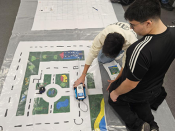Por Davide Viggiano, (University of Campania, Italy).
Davide Viggiano is Associate Professor of Nephrology at the University of Campania in Naples, Italy. After his studies in medicine at the Second University of Naples, Italy, he got a Ph.D. in Human Anatomy at the University of Bari (Italy) focusing on the brain extracellular matrix. During the PhD he did periods abroad at the Institute of Histology in Fribourg (Swiss) and Max Plank Institute (Tuebingen, Germany). He then got a two year fellowship (University of Naples “Federico II”) focusing on behavioural and neuroanatomical phenotypization of various genetic mouse models, with a strong attention to computational neuroscience problems, for which he had several stages abroad: IBRO/FENS Practical summer school at Obidos, Portugal, summer school at Frankfurt Institute Advanced Studies (FIAS)Research Fellow at Institute of Complex Systems. Aiming at testing the new multielectrode arrays for recording dopamine release, he has a stage at the Forschungszentrum Juelich, Germany and collaborated with the IGB group led by U. di Porzio in Naples and with the Instittute of Physics (prof Cassinese). Interested at the metabolic modulations of cognitive functions, in 2018 he got a specialization in Nephrology and has been appointed associate professor of Nephrology since 2020. He has been secondary proposer and member of the management committee of the European COST action CONNECT (Cognitive Decline in Nephroneurology). Davide Viggiano has served as Associate Editor of Kidney and Blood Pressure Research (Karger) and is part of the Editorial Board of Journal Nephrology section brain-kidney, Frontiers cardionephrology and Biomedicines. He is Reviewer Editor for Frontiers in Pharmacology-Translational Pharmacology and for Frontiers in Physiology-Exercise Physiology. He has an ongoing funded project of ministry of health on the effects of Virtual Reality on cognition in hemodialysis patients.


















